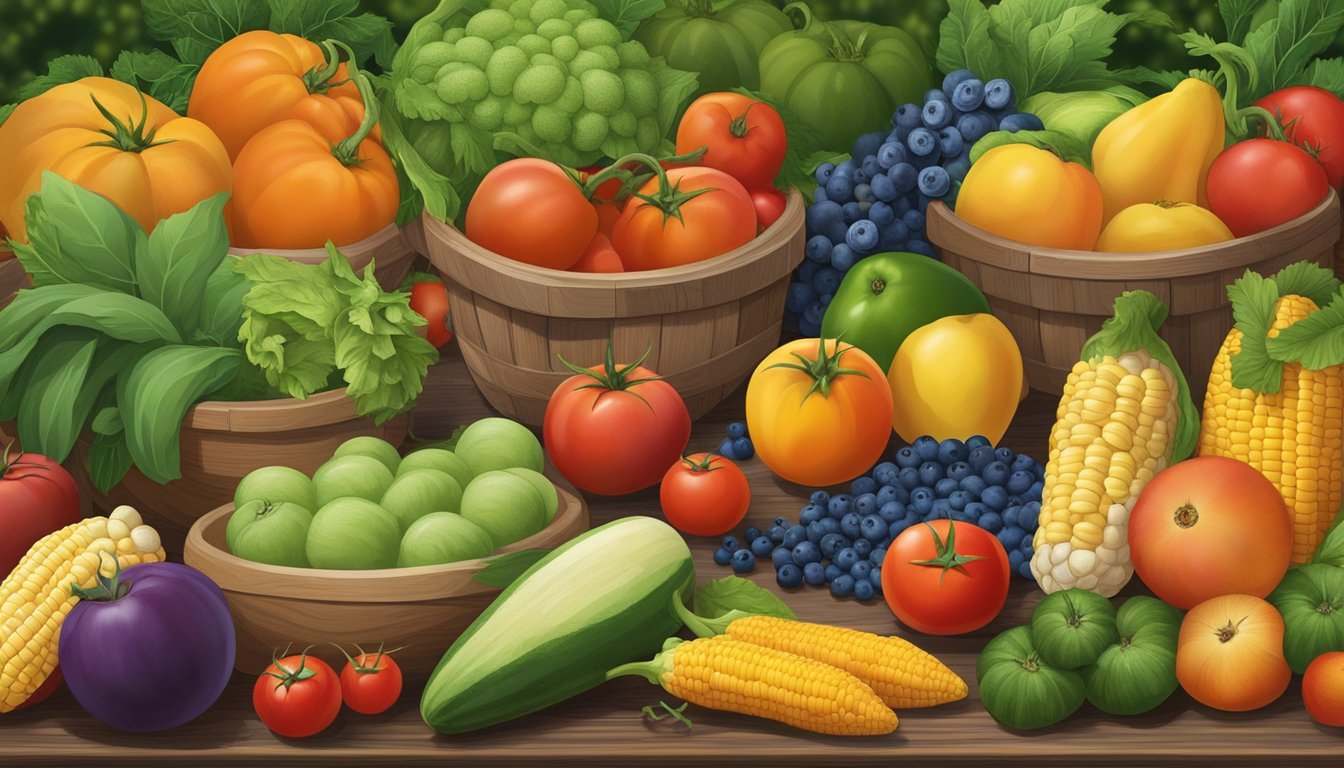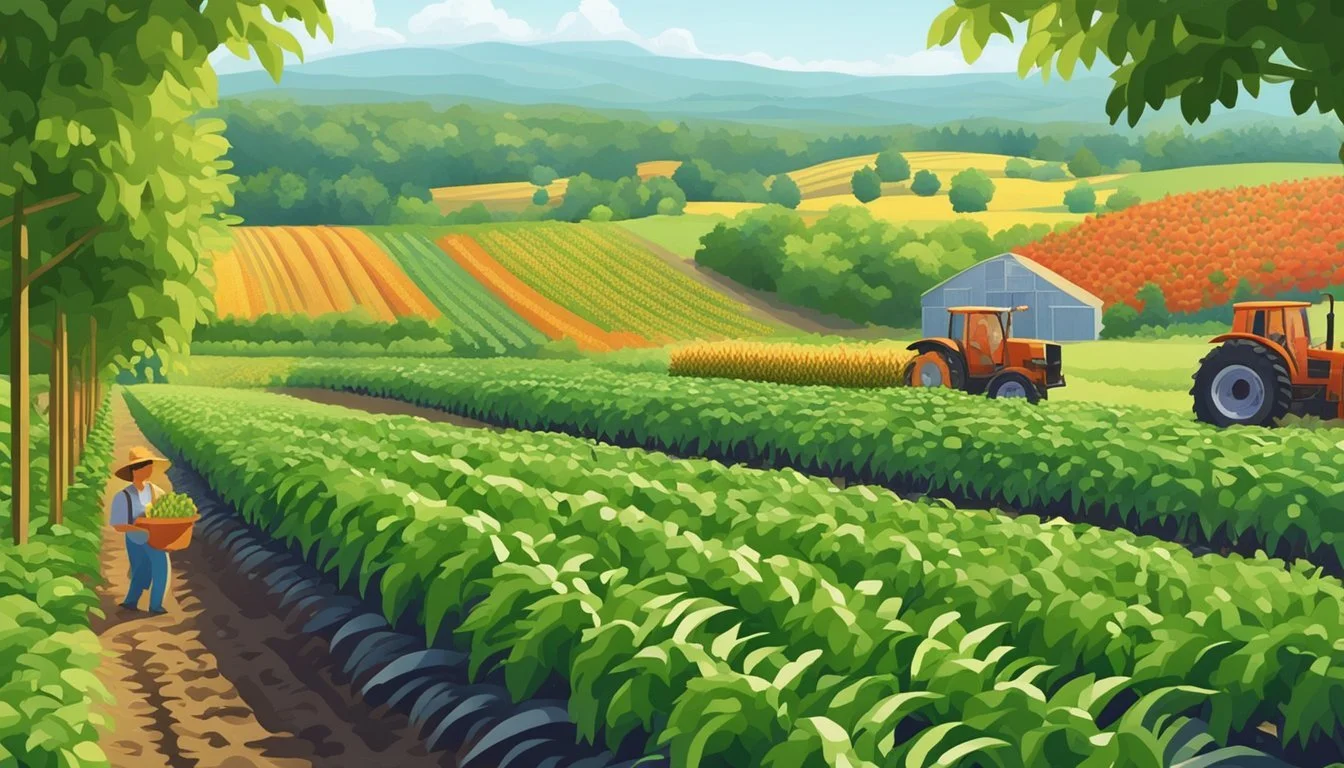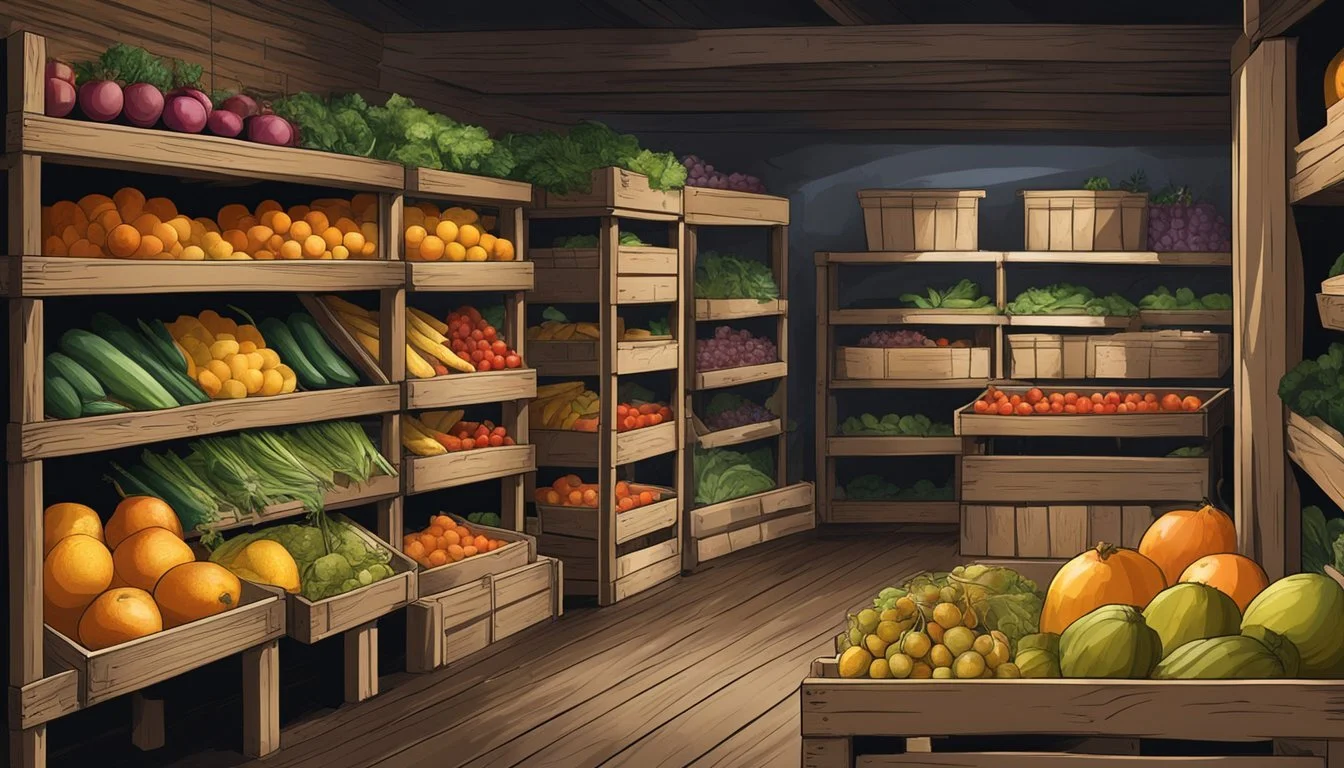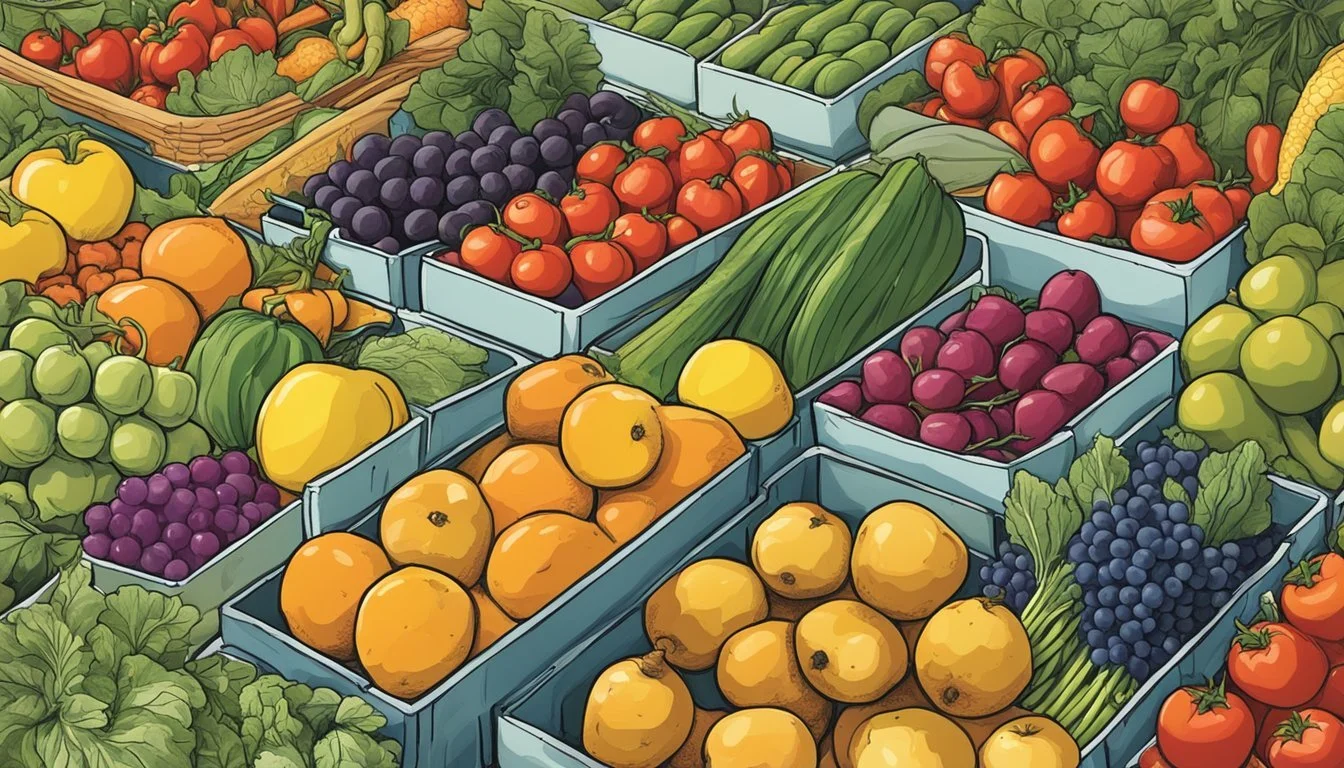New Jersey Seasonal Fruit & Vegetables in July
Your Summer Guide
This Article is Part of our New Jersey Seasonal Fruit & Veg Calendar
In the heart of summer, New Jersey's farms and gardens are bustling with activity as a variety of fruits and vegetables reach their peak ripeness. July in particular marks a season of abundance where the region's fertile land yields a colorful bounty. The state's climate, characterized by warm days and slightly cooler nights, creates ideal conditions for growing a diverse range of produce.
Consumers and chefs alike eagerly anticipate the arrival of July's fresh picks. During this month, one can expect to find an array of fruits such as blueberries (how long do blueberries last?), peaches, and watermelons gracing farmers' markets and store shelves. These juicy fruits not only represent the state's agricultural prowess but also highlight the season's essence with their vibrant flavors.
Vegetables are no exception to the splendor of July in New Jersey. The fields offer a multitude of choices including sweet corn, cucumbers (how long do cucumbers last?), zucchini (What wine goes well with zucchini?), green beans, and a variety of leafy greens. Whether integrated into summer salads or served as fresh sides, these vegetables are a testament to the local farmers' dedication to providing sustainably grown, seasonal produce.
Why New Jersey's Climate is Ideal for July Harvests
New Jersey's July climate provides the warmth and precipitation that are conducive to yielding abundant and flavorful seasonal produce.
Understanding the Garden State's Summer Climate
New Jersey exhibits a humid subtropical climate, particularly in its northeast, central, and southern regions. July is typified by its warm temperatures, with daytime highs averaging around 85 to 90 degrees Fahrenheit. The state benefits from long daylight hours and moderate rainfall during the month. In contrast to its more temperate spring months, July's heat accelerates the growth and ripening of a variety of fruits and vegetables.
Impact of Climate on Seasonal Produce
The ample sunshine and precipitation during July foster ideal conditions for the cultivation and harvesting of a range of produce. At this time, the soil temperature has warmed sufficiently—promoting root development, and the overall consistency in July's weather patterns contributes to reliable crop yields. The predictable summer climate allows farmers to cultivate and harvest produce like:
Fruits: blueberries, peaches, and watermelon
Vegetables: sweet corn, cucumbers, zucchini, green beans, and tomatoes (What wine goes well with tomatoes?)
These crops particularly thrive in the balance of daytime warmth and occasional rain, resulting in some of the most iconic produce that New Jersey has to offer.
Seasonal Fruits Available in July
In July, New Jersey's farms offer a bounty of fresh fruits. The warm climate and fertile soils of the region contribute to a rich harvest, particularly of berries and stone fruits, as well as juicy melons.
Berries and Stone Fruits
New Jersey is prolific in growing a variety of berries. Among them, blueberries stand out as a popular pick in the month of July, renowned for their vibrant color and antioxidants. They are often enjoyed fresh, in desserts, or preserved.
In addition to berries, stone fruits reach their peak during this month. Peaches are especially noteworthy with their soft, fragrant flesh making them a favorite for eating fresh or in pies and jams.
Melons and Exotic Varieties
July also marks the season for melons, with watermelons being the most celebrated. They are appreciated for their refreshing taste and hydrating properties during the warm summer days. Watermelons are commonly found at local farmers' markets and grocers, showcasing their deep green rinds and rich red interiors.
Seasonal Vegetables to Look For in July
In July, New Jersey’s markets abound with a variety of fresh vegetables. Seasonality ensures the produce is at its peak of flavor, nutrition, and affordability.
Leafy Greens and Herbs
July marks an excellent time for leafy green enthusiasts, with lettuce and kale being notably fresh and abundant. One will find a variety of lettuces including crisp Romaine and tender Bibb types, perfect for summer salads. Herbs such as dill (how long does dill last?), mint, and parsley are plentiful and offer a fresh burst of flavor to any dish.
Root Vegetables and Squash
Shoppers can also discover a selection of root vegetables. Beets are a standout, with their deep red hues and sweet, earthy taste. Summer squash, including zucchini, is another July favorite, versatile for grilling, sautéing, or baking.
Pods and Nightshades
Podded vegetables like green beans are tender and ideal for a myriad of cooking methods. Nightshades such as tomatoes are in their prime; from juicy Beefsteak to flavorful Heirloom varieties, these are essentials for summer dining. They pair wonderfully with fresh herbs (how long do fresh herbs last?) and offer vibrant color and taste to any plate.
July's Harvest Calendar
July in New Jersey is a bounty period for fresh produce, offering an array of fruits and vegetables ready for harvest. The timing of the picking dates ensures the utmost flavor and nutrition of the seasonal produce.
Early July Picks
In early July, New Jersey's farms are rich with a variety of fruits and vegetables. The strawberries and cherries (how long do cherries last?)are particularly sweet and ripe for picking. Vegetable enthusiasts can look forward to fresh snow peas, sugar snap peas, and shelling peas. Leafy greens like lettuce and spinach are also abundant, along with broccoli and cabbage, rounding out the nutritious options.
Mid to Late July Harvest
As the month progresses, the diversity of produce available at New Jersey's local farms and markets expands. Juicy peaches enter their prime picking dates alongside blueberries and sour green summer apples which are full of tartness. For a summery treat, watermelon and cantaloupe become ripe and ready. The vegetable selection remains strong with additions like sweet corn, cucumbers, zucchini, green beans, and flat beans. The continued availability of broccoli and cabbage provides consistency throughout the month.
Farming Practices in New Jersey During July
In July, farmers in New Jersey focus on sustainable agriculture practices and employ various local farming techniques to cultivate a variety of crops. This peak summer month sees vigorous farm activity, ensuring a fruitful harvest.
Crop Rotation and Sustainability
Farmers in New Jersey integrate crop rotation into their farming strategy to maintain soil health and control pests. During July, fields that may have grown spring vegetables like lettuce and spinach are typically transitioned to late-season crops. For instance, a field that yielded strawberries in June might be prepared for a succeeding crop such as beans, complying with the principles of sustainability.
The use of crop rotation improves soil fertility and reduces soil erosion. It's a pivotal element of sustainable agriculture, helping to protect the diverse ecosystems within New Jersey's farmlands.
Local Farming Techniques
Local farming techniques in July are designed to deal with the hot, humid summer conditions typical in New Jersey. Farmers often adopt drip irrigation systems which conserve water and direct it efficiently to the roots of plants. This method is crucial for the thirsty crops of the season, such as tomatoes, blueberries, and peaches.
Integrated Pest Management (IPM) is another technique prevalent during July. It employs:
Regular monitoring
Biological control agents
Targeted pesticide applications when necessary
These tactics enable farmers to produce abundant and healthy crops while minimizing environmental impact. Local farming techniques, embraced by New Jersey farmers during July, ensure a balance between meeting the immediate agricultural demands and preserving long-term farm productivity.
Where to Find New Jersey's Fresh Produce
In July, one can enjoy a bounty of fresh produce in New Jersey by visiting local farmers markets and u-pick farms. These venues offer a direct connection to seasonal fruits and vegetables grown in the state.
Farmers Markets and Local Stores
Farmers markets across New Jersey are abundant with fresh local produce in July. Stores such as local grocers often stock Jersey Fresh fruits and vegetables to ensure quality and support local farms. Shoppers can expect to find a wide array of produce, including but not limited to:
Blueberries
Peaches
Watermelons
Cucumbers
Sweet Corn
Local stores may also offer cold storage crops such as apples from previous harvests. The advantage of purchasing from these locations is the guarantee of fresh, seasonal, and locally-sourced produce.
U-Pick Farms and Community Gardens
Community gardens thrive in the warm July weather and u-pick farms offer a hands-on experience for individuals and families. One can pick their own fruits and vegetables, such as strawberries and cherries, which are ripe for harvesting in July. The u-pick farms provide an opportunity not only to choose the freshest produce but also to engage directly with the cultivation process. Below is a list of typical produce available at u-pick farms during this month:
Strawberries (early July)
Cherries
Peaches
It's recommended to check with individual u-pick farms for the exact timings and availability of produce, as well as for any necessary arrangements such as bookings or providing your own baskets.
Recipes Highlighting July Produce
July in New Jersey offers a bounty of fresh produce perfect for a range of delectable recipes. This month's harvest includes robust tomatoes, crisp green beans, a variety of peppers, and refreshing cucumbers which can be transformed into vibrant salads or infused with flavor through grilling and roasting.
Salads and Cold Dishes
The warmth of July invites one to indulge in salads and cold dishes that require minimal cooking. A classic New Jersey Tomato Salad takes advantage of the ripe, juicy tomatoes available during this time. Simply slice the tomatoes and season them with salt, pepper, and a drizzle of olive oil. Elevate the dish by adding slices of cucumber and a scattering of fresh basil.
Green Bean Salad is another refreshing choice. Blanched green beans gain life with a vinaigrette made from olive oil, lemon juice, and finely chopped shallots. For added crunch, one can toss in slivered almonds or walnut pieces.
For those seeking a burst of flavors, Cucumber and Pepper Coleslaw is ideal. Thinly sliced cucumbers and a mix of red, green, and yellow peppers offer a colorful and crunchy base. Toss with a light dressing of yogurt, dill, and lemon zest (how long does lemon zest last?) to complete the dish.
Grilled and Roasted Options
The smoky char from grilling or the caramelization from roasting can transform July's produce. Start with Grilled Peppers Stuffed with Quinoa and Feta, employing red and yellow bell peppers for their natural sweetness. Fill them with cooked quinoa (how long does cooked quinoa last?), crumbled feta, and fresh herbs before placing them on the grill.
Roasted Green Beans with Cherry Tomatoes is a tribute to simplicity and flavor. Toss the beans and halved cherry tomatoes with olive oil, garlic, and thyme. Roast until the beans are tender and the tomatoes are burst, creating a melded flavor profile that pairs excellently as a side dish.
These recipes spotlight the peak-seasoned produce of July in New Jersey, presenting them in ways that celebrate their freshness and inherent flavors.
Storing and Preserving July's Harvest
In July, New Jersey's farms offer a bountiful harvest ranging from blueberries to sweet corn. Efficiently storing and preserving these foods maximizes their shelf life and allows one to enjoy the flavors of summer well into the year.
Canning Techniques
Canning is a reliable method to preserve the taste and nutrients of fruits and vegetables. For tomatoes, a staple in July's harvest, one can opt for water bath canning; this process involves immersing jars in boiling water to create an airtight seal. Blueberries and peaches, abundant in July, are excellent for creating jams and jellies, also using water bath canning.
Acidic Fruits and Vegetables: Perfect for water bath canning.
Tomatoes: pH less than 4.6
Blueberries: pH 3.12 to 3.33
Freezing and Drying Methods
Freezing is arguably the simplest preservation method and best retains the quality of many vegetables and fruits. Sweet corn should be blanched for four minutes before freezing to preserve its texture and flavor. Berries can be frozen individually on a baking sheet before transferring to a freezer-safe container to prevent clumping.
Drying or dehydrating is another excellent preservation technique, especially for herbs and summer squash. A food dehydrator or an oven on a low setting can effectively remove moisture, extending shelf life without the use of preservatives.
Freezing Guide:
Corn: Blanch, then freeze
Berries: Flash freeze on tray, then store
Drying Guide:
Herbs: Dehydrate until crisp
Squash: Slice thinly, dehydrate at 135°F
By employing these techniques, one ensures that July's harvest maintains its quality and taste for months to come.
Conclusion
In the heart of summer, New Jersey's agricultural offerings are at their peak. The month of July is particularly notable for a rich variety of fresh produce. The state's nickname, "The Garden State," truly comes to life with farm stands and markets brimming with vibrant fruits and vegetables.
Notable Fruits and Vegetables Available in July:
Fruits:
Blueberries – renowned for their flavor.
Peaches and Nectarines – juicy and ripe.
Melons – including cantaloupes and honeydews.
Blackberries – perfect for summer desserts.
Vegetables:
Tomatoes – a staple in New Jersey cuisine.
Sweet Corn – a barbecue favorite.
Peppers – from mild to hot varieties.
Cucumbers – crisp and refreshing.
These selections represent only a snippet of the broad array of produce one can savor during July in New Jersey. Each item underscores the benefits of eating seasonally: maximum flavor, nutrition, and support for local farmers. Consumers are encouraged to take advantage of this seasonal abundance and incorporate these fresh ingredients into their meals.






